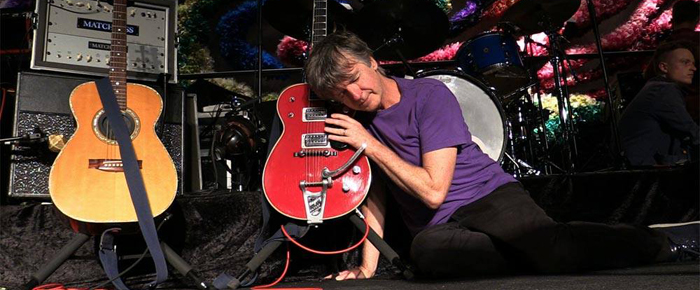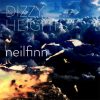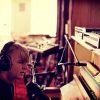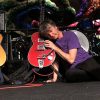
By Eleni P. Austin
If your only knowledge of Crowded House (and Neil Finn) is their gorgeous 1986 chart-topper, “Don’t Dream It’s Over,” then you have missed out on a plethora of excellent music.
Neil Finn, the youngest of four siblings, grew up in Te Awamutu, New Zealand. He idolized and emulated his older brother Tim. Neil learned piano and guitar with Tim and at age 12, he decided he wanted to be a musician. He worked his way through high school and college playing solo shows at prisons, schools and hospitals, basically, any place that would have him.
Tim Finn had started the band Split Enz with Phil Judd in the early ‘70s. The band incorporated myriad styles, from Swing to Music Hall to Punk. They really achieved world-wide success when Judd quit the band and Neil Finn stepped in in 1977. Neil penned the band’s biggest hits like “I Got You,” “History Repeats” and “One Step Ahead.
Tim Finn embarked on a solo career before leaving Split Enz. Once he officially quit, Neil took charge. But Split Enz’ days were numbered. The band broke up in 1984.
Neil Finn hooked up with Split Enz drummer, Paul Hester and bassist, Nick Seymour. They recorded their self-titled debut with producer Mitchell Froom in 1986. Temple Of Low Men followed in 1988.
Neil Finn’s music combined smart lyrics and gorgeous hooks. His concise songcraft echoed pop masters like Lennon & McCartney of the Beatles, as well as Difford & Tilbrook (the brilliant blokes behind Squeeze).
Neil and Tim Finn began collaborating on a fraternal effort, but their songs were so good, Neil asked if they could be used on the next Crowded House album. Tim acquiesced, and actually ended up joining Crowded House for their third album, 1991’s Woodface.
It was their most assured effort to date and included sparkling gems like “Weather With You,” “Fall At Your Feet” and “Four Seasons In One Day.” They released one more album, Together Alone, before the band called it quits in 1996.
Neil and Tim reconnected and finished their brotherly debut, Finn, in 1995. A feat they would repeat 10 years later with the album Everyone Is Here. Each record was awash in the sweet and sour harmonies only siblings can create.
When Neil Finn began his solo career, he really came in to his own. Try Whistling This arrived in 1998 and was followed by One All, in 2002. He also staged all-star concerts under the “7 Worlds Collide” banner.
Featuring artists like Eddie Vedder, Smiths gunslinger Johnny Marr, Jeff Tweedy, and Lisa Germano plus Phil Selway and Ed O’Brien from Radiohead, the shows produced two live CD-DVDs in 2002 and 2009.
Now Neil Finn has returned with his third solo album, Dizzy Heights. Ideally, it should be business as usual for Finn, crafting a subtle mix of economical lyrics and nimble melodies. But this time he has upped the ante, stepping out of his comfort zone.
The opening track, “Impressions,” feels like a lost Barry White/Love Unlimited Orchestra song. Lush and atmospheric, with cryptic lyrics and instrumentation that is all swelling strings and plucky chicken scratch guitar. The results are hypnotic.
The title track and “Flying In The Face Of Love” are even more expansive. The former offers veiled details of a carnal assignation. Shimmery synths propel the action, Finn’s falsetto vocals land comfortably between Smokey Robinson and the Brothers Gibb. “If you don’t like the groove, “Finn warns, “call the cops.”
The latter is sleek and sensuous, accented by squiggly guitar riffs that dart through the mix. Here Finn strips his emotions to the bone…”You must reveal your infinite sorrow, show what you’re made of and what you’re afraid of/You’ll have to leave the comfort of the shadows.” It is kind of a mission statement for the album.
Two songs, “Recluse” and “In My Blood,” explore new textures but retain Finn’s gift for lean, economical story-telling. Anchored by a propulsive waltz melody, “Recluse,” logically points out, “it’s people that you lose when you become a recluse.” Then he goes a step further, name-checking a list of infamous social hermits, Howard Hughes, Greta Garbo, Bobby Fisher and J.D. Salinger as cautionary tales.
“In My Blood” is fluttery and tentative cri du Coeur.Literally a visceral love song, underscored by mesmerizing backing vocals. Finn somberly intones, “Melancholy beats my heart, but you’re in my blood.”
Other stand-out tracks include the chugging Cha-Cha-Cha of “Better Than TV.” “Pony Ride” moves at a galloping gait. The equine motif is a metaphor for life…”There’s no way I’m leaving this pony ride/Somedays I’d rather be mystified then understanding part of it, and have you try to explain again.” Finally, “Strangest Friends feels like an opaque homage to alien invaders swathed in candy-coated synths.
Not every aural experiment is successful, “Divebomber”kind of crashes and burns. “White Lies And Alibis” is a weirdly robotic mini-Rock Opera that seems too ambitious.
The album closes with the spartan “Lights Of New York.” Sinatra-esque in execution, the arrangement is bare-bones, just Finn and a tinkling piano. The lyrics are equally urbane, offering a toast to the city that never sleeps.
This solo album is something of a family affair. Neil’s wife Sharon provides supple bass lines and backing vocals. His sons Liam and Elroy also contribute vocals, guitars and drums, respectively. The album was produced by Mercury Rev bassist, Dave Fridmann (He has also produced albums for eccentric Oklahoma weirdos, the Flaming Lips, MGMT and Tame Impala).
Dizzy Heights is a noble experiment that mostly works. But hopefully, Finn’s next outing will be a return to the meticulous and melodic songcraft he is known for.
















































